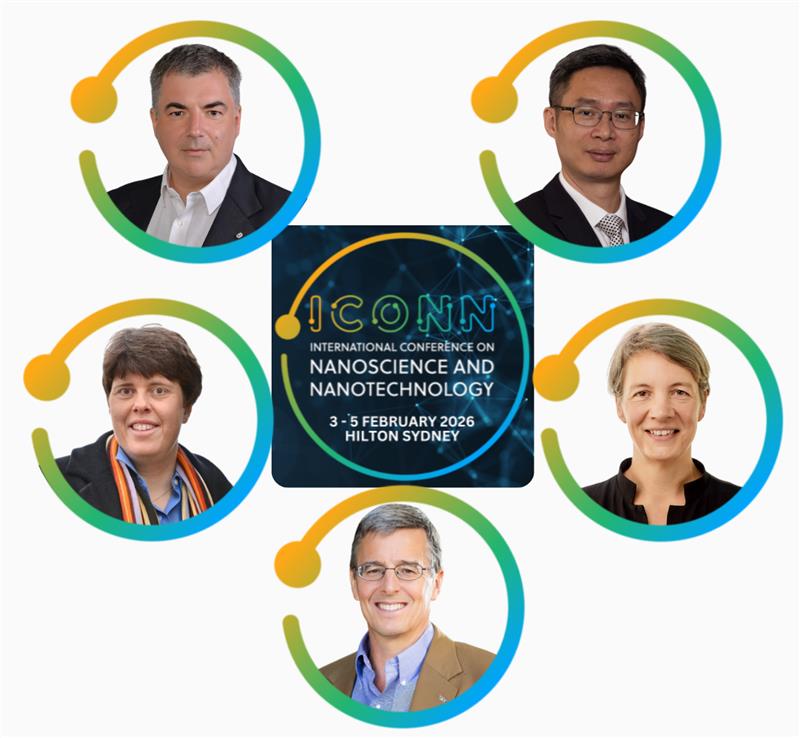The International Conference on Nanoscience and Nanotechnology (ICONN) offers something for the entire international nanoscience and engineering community, encompassing all academic career levels through to industry, venture capital regulatory specialists and all points in between.

This event, to be held at the Hilton Sydney on 3 – 5 February 2026, will attract key industry leaders and decision makers from across Australia, New Zealand and the globe.
As ICONN celebrates its 20th anniversary, the 2026 conference promises a world-class lineup of plenary speakers who are redefining the frontiers of nanoscience and nanotechnology.
From Nobel laureates to pioneers in quantum computing and bioelectronics, these thought leaders will offer insights into cutting-edge discoveries and their real-world impact. Their work exemplifies the spirit of ICONN – where breakthrough ideas meet transformative application.
Sir Konstantin Novoselov is best known for discovering graphene, earning him the 2010 Nobel Prize in Physics. Now based at the National University of Singapore, he leads research into new ‘intelligent’ materials designed with the help of AI. His work continues to inspire global innovation across electronics, energy and smart technologies. Novoselov still holds a position at The University of Manchester, where the graphene breakthrough first took place. He has received numerous international honours and was knighted in the UK for his contributions to science.
Xiaodong Chen leads ACS Nano, one of the world’s top nanoscience journals. Hailing from Nanyang Technological University in Singapore, he develops smart materials and flexible electronics designed to interact seamlessly with humans and the environment. He also explores how machines can better sense, respond to and even feel the world around them. Chen’s innovations are helping to build new kinds of devices that respond to touch, movement and other physical signals – merging technology more naturally with daily life.
Michelle Simmons is a global leader in quantum computing and the Founder and CEO of Silicon Quantum Computing. She is also Director of the Australian Centre of Excellence for Quantum Computation and Communication Technology. Simmons is pioneering the development of quantum computers using single atoms of silicon – pushing the limits of what’s possible in computer design. Her team has built the world’s smallest transistor and the first quantum logic gate in silicon, placing Australia at the forefront of this revolutionary field.
John A. Rogers develops soft, flexible electronic systems that can integrate with the human body – such as wearable health monitors, implantable sensors and smart skin technologies. As Director of the Querrey Simpson Institute for Bioelectronics at Northwestern University (USA), he leads interdisciplinary teams spanning engineering, medicine and materials science. His work is transforming how technology interacts with people, and he is widely recognized for innovations that bridge science, design and human health.
Katharina Landfester designs nanoscale materials that interact with light, chemicals and living systems. Her work focuses on tiny particles and capsules that can be used in drug delivery, medical diagnostics and smart materials. Landfester is a key figure in soft matter research, translating chemistry into tools that improve everyday technologies in healthcare, sustainability and manufacturing. Her leadership as Director at the Max Planck Institute for Polymer Research in Germany helps shape Europe’s contribution to materials innovation.
Be part of the conversation shaping the next era of nanotechnology. Join us at ICONN 2026 by submitting an abstract!
Whether you’re an early-career researcher or an established leader, ICONN 2026 is your opportunity to share your work alongside the field’s most influential voices. Submit your abstract to join a dynamic program that spans disciplines and applications.
The symposia topics explore diverse areas of nanotechnology, including advanced materials, electronics and quantum systems. They highlight biomedical applications like nanomedicine and DNA/RNA nanotech, as well as environmental and energy innovations. Topics also cover computational methods, nanosensors and the mechanics of nanoscale systems, reflecting the interdisciplinary nature of the field.
Download the submission template here.
Submit your abstract here.
For more information, go to https://iconnference.com/abstract-submission-information/
Abstract Deadline: 17 October 2025
ICONN 2026 is more than a conference – it’s a celebration of 20 years of innovation, collaboration and impact in nanoscience. Whether you’re breaking new ground or building on decades of discovery, this is your platform to connect, contribute and be inspired. We look forward to receiving your submission!
Posted 30 July 2025

